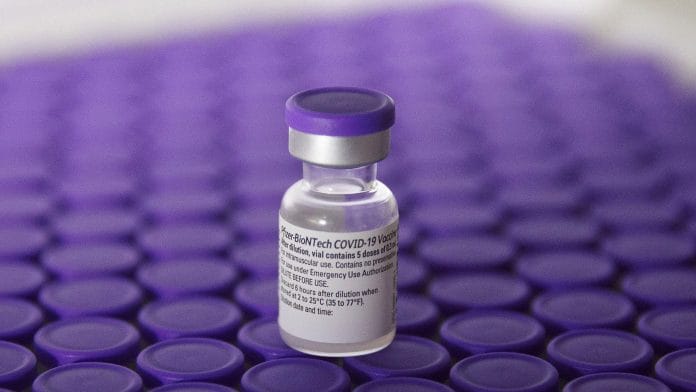New Delhi: Pfizer-BioNTech’s Covid-19 vaccine can prevent both symptomatic and asymptomatic infection in working-age adults, a new study claims.
Officially called the BNT162b2 vaccine, the inoculation was studied among a sample population when the B1.1.7 variant of the coronavirus was dominantly circulating in the UK.
The study, published in The Lancet, was conducted by Public Health England, which comes under the UK’s Department of Health and Social Care, and the National Institute for Health Research.
According to their research, the B1.1.7 is a new variant of SARS-CoV-2, the virus that causes Covid-19. The variant was first detected in the United Kingdom in September 2020 and is known to spread more easily than older variants. A new study now adds to the body of evidence that B.1.1.7 is also more deadly than previous variants, causing around 64 per cent more deaths in pairs of individuals matched for factors such as age, gender and ethnicity.
The study involved 23,324 participants from 104 locations across England who were divided into two cohorts — vaccinated and unvaccinated. Participants had a median age of 46.1 years while 84 per cent (19,692 participants) were female.
The study was aimed at determining the factors associated with vaccine coverage and to document the vaccine’s effectiveness in a cohort of healthcare workers undergoing regular asymptomatic testing.
Pfizer vaccine was rolled out in the UK in December 2020.
Also read: Modi govt wants more Covid vaccines, but Moderna is ‘not keen’ & Pfizer has this ‘condition’
Study findings
The study found that 977 people who did not receive the vaccinate got the infection as opposed to nine people who received both doses of the vaccine. Results showed that a single dose of the vaccine had a 70 per cent efficacy while both doses had a 85 per cent efficacy.
“There were 977 new infections in the unvaccinated cohort, with an incidence density of 14 infections per 10,000 person-days; the vaccinated cohort had 71 new infections 21 days or more after their first dose,” the study said.
This indicates an incidence density of eight infections per 10,000 person-days and nine infections seven days after the second dose, which is an incidence density of four infections per 10,000 person-days.
According to the US Centre for Diseases Control and Prevention, person-days is used to calculate health outcomes in an epidemiology wherein it is an estimate of the time-at-risk (to SARS-CoV-2 infection) each participant contributed to the study.
In the unvaccinated cohort, 543 participants (56 per cent) had typical Covid-19 symptoms and 140 participants (14 per cent) were asymptomatic on or 14 days before their RT PCR positive test date. In the vaccinated cohort, 29 participants (36 per cent) had typical Covid-19 symptoms and 15 participants (19 per cent) were asymptomatic.
Pfizer BioNTech’s vaccine is a messenger RNA (mRNA) vaccine that has both synthetic (chemically produced) components and enzymatically produced components from naturally occurring substances such as proteins. Unlike other vaccine candidates such as Covishield and Covaxin, this vaccine does not contain any live virus. Its inactive ingredients include potassium chloride, monobasic potassium, phosphate, sodium chloride, dibasic sodium phosphate dihydrate and sucrose, as well as small amounts of other ingredients.
(Edited by Manasa Mohan)
Also read: Pfizer’s Covid shot remains more than 91% effective even after 6 months, trial finds







This is such a blatant advertisement ……….The Print should declare how much Pfizer paid it.